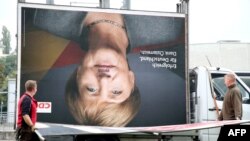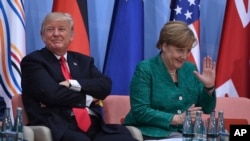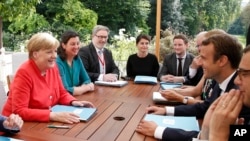Earlier this year, the U.S.-based Pew Research Center polled people in more than 30 countries about their thoughts on various world leaders. German Chancellor Angela Merkel topped the poll with more respondents expressing confidence in her than any other leader.
With the U.S. turning more isolationist, Britain mired in Brexit wrangling, and France led by an untested young president whose popularity is already plummeting, many see Merkel, who on Sunday secured an historic fourth term — though her Christian Democratic Union party won fewer seats — as the West’s most reliable leader.
American and European newspapers have dubbed her the “leader of the free world” for much of 2017.
But questions remain about how proactive Merkel will be when it comes to foreign policy in her fourth term — and how she might approach the crowd of significant challenges facing Germany and Europe, including terror, war, financial crises, and political upheavals. The scientist-turned-politician’s instinct is to search for consensus — but that is a difficult thing to do when faced with alpha male leaders, such as Donald Trump and Turkey’s Recep Tayyip Erdogan, who see diplomacy as a zero-sum game.
Earlier this year, following Trump’s announcement that he would withdraw the U.S. from the Paris climate-change pact, Merkel counseled fellow Europeans that they must take fate into their own hands. “The times in which we could rely fully on others — they are somewhat over,” she said.
In an interview on the eve of Sunday’s elections Merkel appeared to signal that she intends to push for more coherence in European Union foreign policy, telling the German newspaper Frankfurter Allgemeine Sonntagszeitung, that the bloc has to agree quickly to a common stance toward an emerging China and a revisionist Russia.
“The world has to see that member states won’t deviate from a European consensus on these issues,” she said, adding that it was important that individual state governments be prepared to defer in favor to what was the best for the EU as a whole.
So will Merkel start laying down a foreign policy legacy, take her fellow European leaders by the scruff of their necks and live up to the media designation “leader of the free world”?
Taking the lead
Already under her leadership Germany has become more assertive — a reflection of the country’s economic pre-eminence in Europe as well as it having come more to terms with its Second World War past. Merkel has deployed German troops overseas: in Afghanistan, Mali and Lithuania.
She was the leader who forged a European consensus on imposing sanctions on Russia for its annexation of Crimea, and along with the French, she has been leading the West’s effort to negotiate a solution to the Russian-fomented conflict in east Ukraine.
In sub-Sahara Africa, her government has been pursuing a “Marshall Plan for Africa,” pumping aid and encouraging private investment in a bid to undercut jihadists and to give would-be migrants a reason to remain at home.
And there is some talk that post-election she will team up with French President Emmanuel Macron to “relaunch” a post-Brexit Europe more integrated and centralized than ever before.
But Merkel’s past suggests she will be far more cautious when it comes to matching action with words, predict some analysts. And she'll move slowly.
Synonymous with slow
The epitome of the patient pragmatist in politics, she is more reactive than proactive. In 2015 the verb ‘to Merkel’ – meaning to dither – was voted the new word of the year in Germany. Merkel is more about incremental change that won’t upset the multilateral rules-based global order.
Political scientist Matthew Qvortrup, a professor at Britain’s Coventry University and author of a biography of Merkel, noted recently that she’s a manager, more comfortable keeping things ticking along. He doesn’t think Merkel will endorse as daring an overhaul of the EU as proposed by the grandiloquent Macron.
The French president wants six-month-long ‘democratic conventions’ in every country, during which EU citizens would debate common goals and a more integrated eurozone with its own finance minister, parliament and a standalone budget to head off future financial crises.
Earlier this year, Merkel gave qualified endorsement of Macron’s reform ideas but analysts say perceptions in Paris and Berlin of eurozone integration widely differ. Qvortrup draws a distinction between Merkel and her predecessor Helmut Kohl, the chancellor who oversaw the unification of Germany and had a much grander vision for the EU than Merkel does.
“She’s interested in the European Union as an intergovernmental project – a little bit like the ‘Europe of nations,’” he said in a recent interview with Chatham House, a British policy research group.
Other analysts question why Merkel would agree to a massive reform of an economic structure which Germany has benefited from greatly.
It's the little things
Her party’s manifesto for Sunday’s election was short on grand projects and big on small measures, although it committed to raising defense spending from 1.2 percent of GDP to the NATO target of two percent. But boosting the military isn’t the same thing as using it — a recent poll showed a majority of Germans uncomfortable with the idea of using force even in the defense of NATO.
But German journalist Bernd Ulrich, political editor of the German weekly Die Zeit, argues Merkel’s leadership traits are of a different kind from her more brash counterparts. The fact that she doesn’t have grand plans doesn’t mean she’s not leading, he argues.
“It was a very American misunderstanding to call the German chancellor the new leader of the Western world. Merkel can only be the leader if ‘leadership’ is something completely different—something based on networking, something female, and something cooperative,” he wrote recently.
Her cooperative instincts though will be challenged in her fourth term. The EU faces unrest in the east, with populist governments in Poland and Hungary defying Brussels on immigration policy and civil liberties. Another problem will be getting some order on Brexit — and on that issue she may turn hardline on a British government keen to cherry-pick when it comes to future relations between Britain and the EU.
But her biggest challenge remains with the U.S., where Trump’s “America First” ideas and suspicion of multilateralism are directly at odds with her determination to protect a rules-based order.






